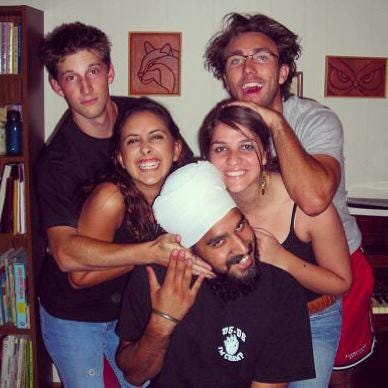Building Real Unity
How do we put the unity in community?
Before I went to college, I thought the people most like me were the ones whose families hailed from Punjab like mine did, who spoke the same language as us, who shared the same Sikh beliefs that we did. Who would have thought that one of my closest friends would be an Iranian American Baha’i who grew up in Puerto Rico?
Nava was an English major like I was, so we had many classes together. She was one of the few people in our friend circle who didn’t drink alcohol, so we’d inevitably find each other at parties, the designated drivers, or at least, the designated walkers. And our junior year, Nava and I channeled our curiosity for religion and spirituality to help start the school’s interfaith club.
After college, our journeys continued to crisscross. She had a passion for human rights and education and religion, just like I did. She studied and worked all over the world, including China and Israel. Eventually, she made her way to New York to work with the UN. I’d been there pretty much all that time, making my way through grad school, slowly but surely.
In the years since, there’s another step that Nava and I seem to have taken together. We both have come to understand that cultural change comes through storytelling. Mine came first in the form of writing and speaking, and now it is taking other forms, like our new television show, Undivided. For Nava, this came in the form of podcasting and filmmaking. She has an incredibly popular show called Podcrushed, which she hosts with Penn Badgley and Sophie Ansari. She also has a new book coming out with that same trio called Crushmore. And she’s working on movies now, too.
I’ve had so much to admire about Nava over the years: her commitment to justice, her infectious laugh, her willingness to dive into new projects and new fields. But what I’ve admired most is her ability to build community wherever she goes. Everyone loves Nava and the light she brings into our world.
So when it came to deciding on guest for the season finale of Wisdom & Practice, Nava came to mind immediately. I’m excited to share her with you and hope that you feel as enriched by our conversation as I did.
I’m pasting an excerpt from our conversation on Wisdom & Practice below. Click here to listen to the full episode.
Simran Jeet Singh: I love your emphasis on the ends not justifying the means—that the means are just as important as the ends themselves. That’s something I think about a lot, especially coming from a tradition that teaches us it’s not just what you do, but how you do it and why you do it that matters. I think about that often in this society, because it feels like we’re often given the opposite message, you know, that it’s the endpoint that determines whether we’re successful, and it doesn’t really matter how we get there.
Going back to this idea of oneness, it feels like if we want social cohesion and healing in the world, which so many of us talk about, then we also need some sense of wholeness internally. And integrity is probably an important ingredient there. Even the word “integrity”—integrating, creating wholeness—points to that.
So I wonder if we could take it to a personal level for you. What does it look like for you to live with integrity? To live in a way where the means are taken as seriously as the ends? Especially as someone who’s now in Hollywood, who’s worked in education–you’ve been in all these different spaces that are so driven by metrics and ambition. How do you personally balance that?
Nava Kavelin: Yeah. Well, one thing is that you can have high ideals without being their perfect embodiment. I would never claim to perfectly embody mine. I hope I have high ideals, but I know I fall short.
This past year was really a year of being humbled and taking stock. I kept thinking about this idea—it’s not profound, but it stuck with me—that how you spend your time and how you spend your money reflects what you value...not what you say you value, but what you actually value.
So I started doing a little internal audit: how am I spending my time, how am I spending my money? And I wasn’t thrilled with the results. There was a gap between what I thought I valued and what my choices showed I valued. It was really eye-opening.
Those kinds of check-ins are so important for integrity. It doesn’t mean you’re dishonest, but it’s easy to think you’re living one way and then see the data telling you another. It’s like when you think, “Oh, I spend two hours a day on my phone,” and then your screen-time app says seven. Sometimes you need that reality check.
For me, that meant asking: Is this really how I want to spend most of my free time? Is this where I want my money to go? And then making some shifts. I know I want to spend a lot of time with my family—that’s really important. I also want some time just to have fun and enjoy life, like dance classes, entertainment, those things matter too. But I also want a lot of my time to go into service, into building community. And I realized I wasn’t doing enough of that.
So, for me, it’s about taking stock, being honest about the gaps, and then making sure there’s more alignment between what I say I value and how I’m actually living.
Click here to listen to our full episode on Wisdom & Practice.


